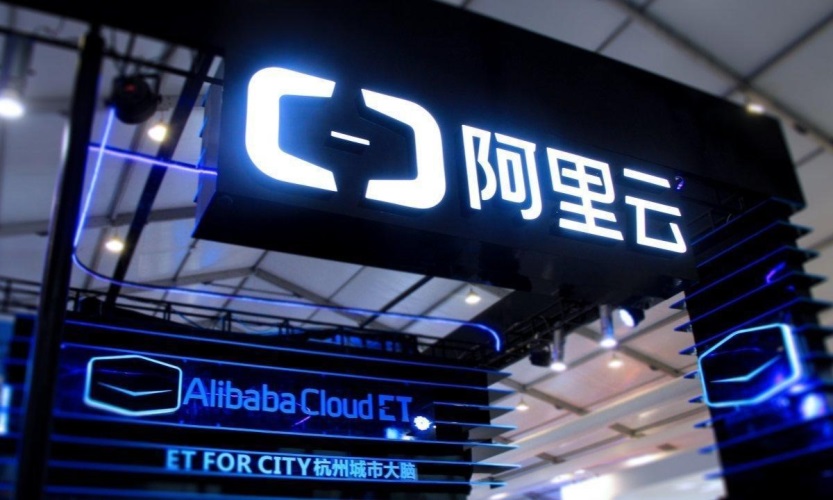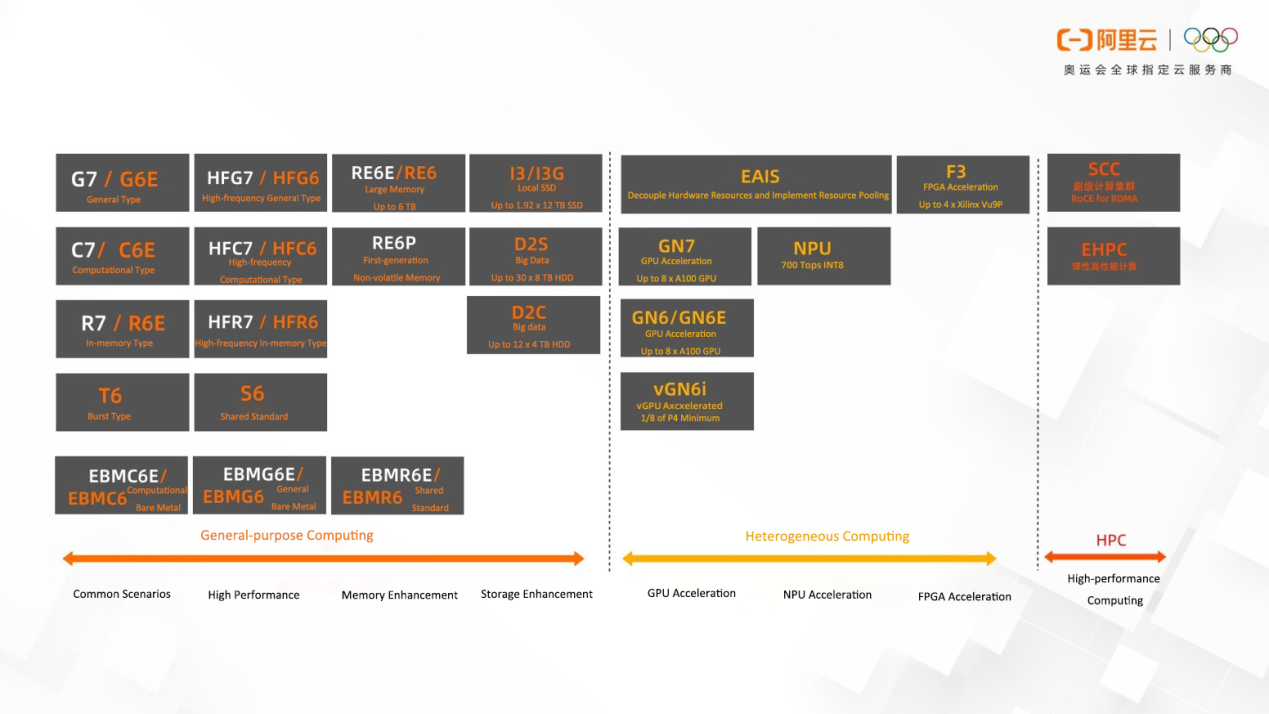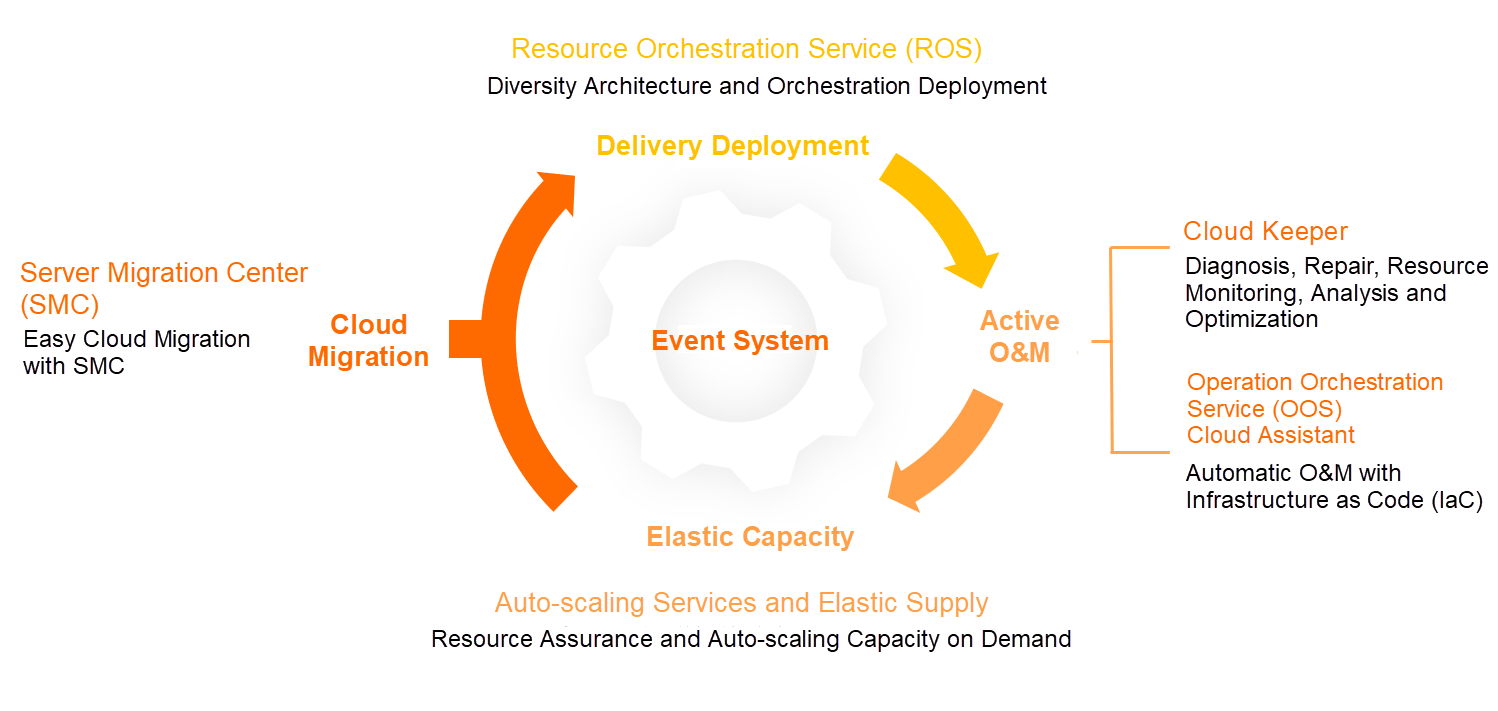Alibaba Cloud 7th Gen ECS is now available! Fully equipped with TPM chips and increase instance computing power by up to 40%. Learn more at this link!
Alibaba Cloud has released seven generations of their cloud server over ten years of cloud computing development. The performance improvement of each generation of Alibaba Cloud ECS products guides the development trends of cloud computing. Let's take a look at the release of the seventh generation ECS product and get a glimpse of the future trends.

Over the last ten years, cloud computing has gone from nothing to an infrastructure.
Like many social changes, it is a top-down process for its development (no matter at home or abroad), as the earliest use of cloud computing came from small and medium-sized webmasters or start-ups because they could not afford the expensive costs of data center construction and server maintenance like large and medium-sized enterprises.
What attracted them the most were the earliest cloud computing products (also called cloud servers) and Elastic Compute Service (ECS). ECS turns computing into resources like water, electricity, and gas. Users can access it and release it at any time; that’s why it is elastic.
Today, as the top cloud computing vendor in China, Alibaba Cloud already has a variety of cloud products as a platform that integrates many cutting-edge technologies. However, ECS remains the base of cloud computing and provides powerful computing abilities for upper-layer applications. It is also the first stop for enterprise cloud migration.
Only one common specification was available for the earliest cloud server. Today, the Alibaba Cloud ECS family provides the best choice for different scenarios, such as general-purpose computing, heterogeneous computing, and high-performance computing. In 2020, Alibaba Cloud ECS showed its support for more than 300 scenarios.

In February 2021, Alibaba Cloud took the lead in announcing the invitation to test the seventh generation ECS based on the Intel Ice Lake processor. On April 20, Alibaba Cloud announced the official beta test of the seventh generation ECS.
Based on the Alibaba Cloud X-Dragon architecture, the seventh generation ECS product family has comprehensively upgraded its computing, network, and storage with the help of the 3rd generation Intel Xeon Scalable Processor Ice Lake. The computing capability of the machine improved by 50%, the performance of database read/write and video encoding/decoding improved by 50% and 40%, and the blockchain computing performance improved 8-10 times.
Additionally, the seventh generation ECS provides network and storage burst capabilities. If the networks or storage resources of small and medium-sized ECS instances are often idle, users will receive credits. These credits can be used in exchange for network bandwidth that is higher than the specification SLO (performance metrics), PPS and storage bandwidth, and IOPS, effectively protecting the customer's temporary sudden business.
The performance upgrade is a standard upgrade for each generation of ECS instances. If you take a closer look at the capabilities of the seventh generation Alibaba Cloud ECS, comprehensive security protection is also another capability that made the biggest improvement over previous generations. In addition to the comprehensive three-dimensional protection of the seventh generation ECS, Alibaba Cloud ECS has many unique capabilities, reflecting the development trend of cloud computing.
According to the product manager responsible for the seventh generation ECS, Alibaba Cloud’s seventh generation ECS is fully equipped with a trusted chip. For the first time, all security chips are equipped as the hardware trusted root to enable the trusted startup of servers and ensure zero tampering. At the virtualization layer, it supports the virtual trust capability and verifies the core components during instance startup. The trusted technology interfaces are also open to supporting secondary development as needed.
Trusted technology is a digital security protection technology that creates a set of benchmarks in advance to define the required operating environment. When a user's system or software starts or runs, if the status does not match the baseline, an alert is sent or the access is blocked.
Traditional computer security protection mainly collects a series of vulnerabilities or virus databases as blacklists to detect applications. If any vulnerabilities are found, patches or anti-viruses are applied promptly. However, once the virus becomes authorized to control the operating system, the security software in the system may not be able to detect this virus. Trusted computing features pre-prevention and discovery. The combination of the two concepts will make cloud security more comprehensive.
Alibaba Cloud believes that trusted computing will become the standard for cloud servers due to many factors, such as the maturity of technology development, customer experience, and policy environment.
On a trusted basis, Alibaba Cloud's seventh generation ECS supports encrypted computing and makes running data available but invisible. Generally speaking, this is like building an encrypted safe in a computer. No one can see the data inside, but the data can be calculated in the safe. This technology can be applied in finance, government, blockchain, and other scenarios that require multiple parties to “share” data for computing.
Alibaba Cloud is the first cloud vendor in the industry to configure trusted computing and encrypted computing. Combined with the Alibaba Cloud cloud-native security capabilities, it provides three-dimensional security protection in all aspects.
The seventh generation ECS is built on the third generation X-Dragon architecture and is equipped with the latest generation of Alibaba Cloud virtualization architecture for the first time. This architecture ensures the high-performance and stable delivery of instances under ultimate concurrency. The exclusive virtualization, soft real-time scheduler reduces the vCPU scheduling latency P999 by 20% to speed up the response to users' businesses. The exclusive hard core technology with software-hardware coordination for hot upgrade reduces the service interruption to zero, truly realizing zero perception of customers' businesses when the underlying faults occur.
The X-Dragon architecture is one of Alibaba Cloud’s cutting-edge technologies. ECS continues to lead the industry in performance. In 2017, Alibaba Cloud officially released its proprietary virtualization architecture X-Dragon featuring software-hardware integration, which has been applied to all the cloud services. In 2019, all the core business systems for Double 11 were migrated to Alibaba Cloud, which were supported by X-Dragon servers.
In the cloud-native era, big Internet enterprises have extremely high requirements for the agility and stability of IT architectures in dealing with instantaneous peaks. Based on the X-Dragon architecture, the seventh generation ECS can deliver 500,000 vCPUs within three minutes. It meets customers’ requirements for elastic containers and other resources and is the best carrier of cloud-native applications.
According to Zhang Xiantao, Head of Alibaba Cloud Elastic Compute, the X-Dragon bare metal server improves performance by 20% to 30% when running containers compared with offline physical servers. Even when the CPU load is as high as 80% or 90%, the performance is still very stable. This performance is unparalleled from other cloud servers.
The high performance of the X-Dragon architecture mainly comes from the design idea of software-hardware coordination. It uses a dedicated X-Dragon chip to handle virtualization and forwarding, which improves performance significantly. It is a virtualized architecture that was born for the cloud. Therefore, Alibaba Cloud believes this technology architecture will become the mainstream choice of cloud technologies.
In addition to the enhanced capabilities of instances, such as robustness, stability, and security, Alibaba Cloud ECS continues to optimize the overall user experience for using and managing cloud resources. No matter which ECS instance users purchase, they can enjoy efficient and intelligent services.
Looking back at the industrial development, the Infrastructure as a Service (IaaS) layer of cloud computing was originally designed to only provide general Infrastructure. Later, it began to develop cloud server families tailored to different scenarios. Now, Alibaba Cloud elastic compute has come to the third stage: providing efficient and intelligent scenario-based IaaS + service capabilities to help customers manage and use the cloud efficiently.
It is difficult to pass the improvement of user experience with performance metrics. An enterprise may perform migration, deployment, O&M, and other operations on the cloud. Easy-to-use O&M tools can improve management efficiency. Currently, Alibaba Cloud ECS provides a complete set of automated O&M kits to help customers build cloud-based O&M systems at a low cost according to the lifecycle of instances.

For example, Auto Scaling can scale capacity in or out automatically to improve the utilization of cloud resources. ROS can help a leading SaaS enterprise reduce the deployment time on the cloud from two days to two hours. The health diagnosis function of the self-help instance helps users locate cloud server problems quickly.
Due to the emergence of AI technologies and the trend of migration to the cloud in the manufacturing industry in recent years, cloud computing capabilities are in high demand. The X-Dragon AI acceleration engine developed by Alibaba Cloud ECS provides deep performance optimization for on-cloud AI training and inference, which improves the efficiency of on-cloud AI significantly.
The capabilities above are also supported in the latest seventh generation ECS, allowing users to enjoy the carry-on experience.
Cloud migration has become a trend in various industries. Also, the demand for edge computing is increasing with the rapid development of big data, AI, IoT, 5G, and other technologies. Some require the computing capabilities to be more end user-oriented or more data-oriented, which means operations need to be performed at a specific location. Users' demand for computing has extended from full coverage in all scenarios to location ubiquity.
Since the cloud is more widely distributed outside the core data center area, it can be seen that a new era, the era of distributed cloud, is coming. Customers have more choices when choosing where to deploy applications, which can save data migration costs, meet extreme latency requirements, and improve user experience. A consistent experience is important across all the distributed deployments of the cloud.
Zhang Xiantao, Head of Alibaba Cloud Elastic Compute, once proposed the trend of distributed or cloud-edge-end integration on different occasions, such as media interviews and speeches, at the 2020 Apsara Conference. Cai Junjie, the Chief Architect of Elastic Compute, also analyzed in-depth in his articles that distributed cloud is the future of the cloud.
To this end, the Alibaba Cloud ECS Team has developed the capability of cloud-edge-end full coverage, which is the full coverage of computing locations, including Edge Zone, Hosting Zone, Partner Zone, and CloudBox. This month, the seventh generation ECS in the public beta will also support output in different forms and locations, giving users a high-performance and intelligent O&M experience consistent with a public cloud.
With cloud-edge-end coordination, Alibaba Cloud ECS has launched a series of new product deployments and operations to meet the diverse needs of customers and partners in terms of computing locations and operation models. Meanwhile, the public cloud is extended to an even broader space to prepare for the edge computing and 5G era with customers.
Disclaimer: The views expressed herein are for reference only and don't necessarily represent the official views of Alibaba Cloud.
Analysis of JDWPMiner Mining Trojan: Remote Debugging with Java Causes Hidden Risks

2,593 posts | 792 followers
FollowAlibaba Cloud Community - August 26, 2025
Alibaba Clouder - March 1, 2021
Alibaba Developer - January 9, 2020
Alibaba Clouder - December 10, 2019
JJ Lim - April 19, 2023
Alibaba Clouder - August 17, 2020

2,593 posts | 792 followers
Follow Elastic High Performance Computing Solution
Elastic High Performance Computing Solution
High Performance Computing (HPC) and AI technology helps scientific research institutions to perform viral gene sequencing, conduct new drug research and development, and shorten the research and development cycle.
Learn More ECS(Elastic Compute Service)
ECS(Elastic Compute Service)
Elastic and secure virtual cloud servers to cater all your cloud hosting needs.
Learn More Elastic High Performance Computing
Elastic High Performance Computing
A HPCaaS cloud platform providing an all-in-one high-performance public computing service
Learn More Function Compute
Function Compute
Alibaba Cloud Function Compute is a fully-managed event-driven compute service. It allows you to focus on writing and uploading code without the need to manage infrastructure such as servers.
Learn MoreMore Posts by Alibaba Clouder